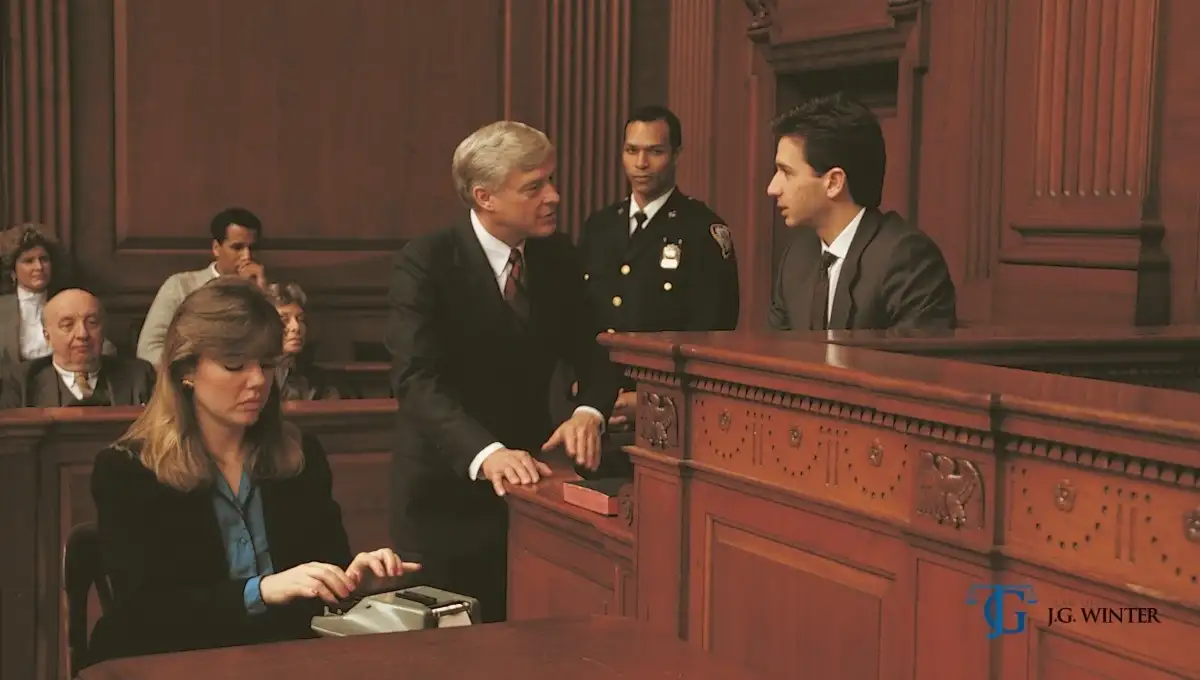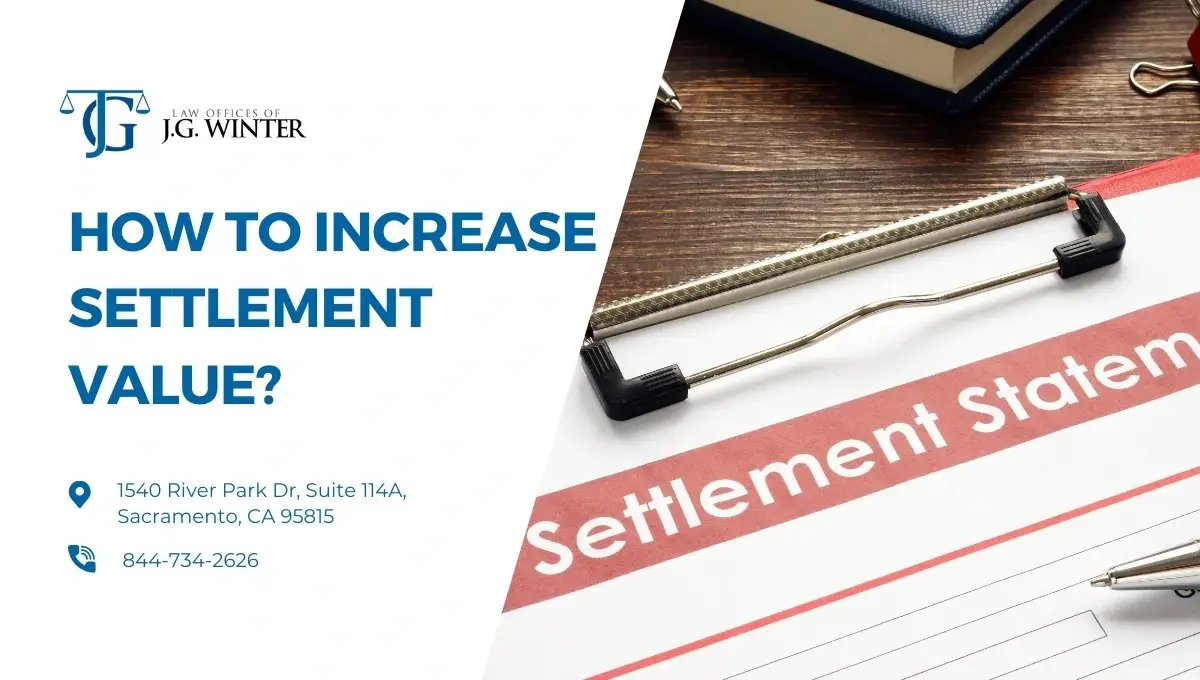Dealing with injuries from an accident can be life-altering, leading to substantial medical costs and lost wages. If the process seems daunting, remember that you are not alone. Knowing how to increase your settlement value is essential for receiving fair compensation. Many struggle to advocate for themselves in the aftermath of an accident, whether from a car crash, slip and fall, or other unfortunate events. This guide aims to arm you with essential documentation tips for personal injury claims, strategic insights to maximize insurance payouts, and proven negotiation techniques while pinpointing common pitfalls to steer clear of.
Understanding settlement value in California
Dealing with personal injury claims in California requires a clear understanding of settlement value to ensure you maximize your compensation. This knowledge is critical in making informed decisions throughout your claim process.
What is settlement value?
Settlement value is the compensation you can expect through negotiation or litigation for a personal injury claim. It includes compensation for direct costs and losses, such as medical expenses, lost wages, and other damages you might not initially consider. Knowing your settlement value is essential to prevent accepting an offer that undervalues your claim.
Factors influencing settlement value
Understanding the factors that influence the settlement value is key to building a strong case:
Types of damages considered
- Economic damages cover tangible costs, such as medical bills and lost wages.
- Non-economic damages include subjective losses such as pain and suffering, emotional distress, and reduced quality of life.
- Punitive damages include punishment to the wrongdoer for their harmful actions to prevent similar behavior in the future.
Each type of damage contributes to calculating the overall settlement value.
Role of liability and insurance coverage
- Identifies fault: Determining who is at fault is crucial as it directly impacts the viability of your claim.
- Affects compensation: The clearer the liability, the stronger your position in claiming full compensation.
- Strengthens negotiations: Demonstrating clear fault aids discussions with insurers.
- Limits payouts: The at-fault party’s insurance policy limits may cap the compensation available.
- Confirms responsibility: Establishing fault confirms the at-fault party’s responsibility to cover your damages.
Preparing your claim: Immediate steps after an accident
Taking immediate action after an accident is vital for building a strong foundation for your personal injury claim. Knowing and executing the right steps can protect your rights and enhance your chances of a successful settlement.
Essential first actions
- Call emergency services: Ensure notifying medical help and law enforcement.
- Document the scene: Take photos of the accident, vehicle damages, and relevant environmental conditions.
- Gather witness information: Collect names and contact details of witnesses.
- Seek medical care: Get evaluated by a healthcare professional, even for minor injuries.
- File an accident report: Ensure law enforcement files a formal report for your records.
These actions are not just procedural but essential in establishing the facts of the accident and providing foundational support for your claim.
Importance of prompt reporting and documentation
Timely reporting and meticulous documentation are pillars of a strong personal injury claim:
- Strengthens your case: Establishing a clear and documented timeline of events solidifies the basis of your claim.
- Facilitates effective documentation: Collecting evidence quickly ensures accuracy.
- Avoids claim denials: Delays in reporting can lead to disputes or denials by insurers.
- Enhances negotiation power: A well-documented claim strengthens your position during settlement negotiations.
- Supports legal representation: Comprehensive documentation aids your attorney to advocate effectively on your behalf.
Taking these steps prepares you for a strong legal approach. It significantly impacts the effectiveness of your negotiations and the potential settlement amount.
Overcoming common challenges in settlement negotiations
Settlement negotiations can present challenges that hinder your ability to secure fair compensation. Recognizing and overcoming common obstacles is key to successful negotiation outcomes.
Fear of negotiation and common misconceptions
Many individuals hesitate to negotiate due to fears or misconceptions. Here’s how to confidently address these challenges:
- Fear of rejection: Understand that rejection is part of the negotiation process, not a personal failure.
- Myth of inexperience: Remember, you can learn negotiation skills over time—every negotiator starts somewhere.
- Overcoming intimidation: Approach negotiations as a discussion rather than a confrontation to reduce pressure.
- Belief in finality: Treat the first offer as a starting point; it’s rarely the best or final offer.
- Encouragement to advocate: Have confidence in the merits of your case and advocate for yourself confidently.
Lack of proper documentation
Proper documentation forms the backbone of a strong claim. Ensure you have gathered the following:
- Accident report: Obtain a copy of the official police report.
- Medical records: Collect all relevant medical records and associated bills.
- Witness statements: Document and organize statements from any witnesses to the accident.
- Photos of the scene: Collect photographs detailing all aspects of the accident scene.
- Insurance correspondence: Maintain a thorough record of all communications with insurance companies.
Underestimating the value of the claim
Recognizing the full potential of your claim is essential for effective self-advocacy. Here are tips to ensure you don’t undervalue your case:
- Assess all damages: Include all relevant economic and non-economic damages.
- Research comparable settlements: Investigate previous settlements in similar cases to gauge potential outcomes.
- Consult with professionals: Engage an injury lawyer to provide a thorough evaluation of your claim’s value.
- Document personal impact: Reflect on and record how the injuries have impacted your daily life and well-being.
- Confidence in worth: Remind yourself that your experience and suffering deserve fair compensation.
Strategies to maximize your settlement
Maximizing your settlement requires a proactive approach to gathering evidence and utilizing modern technology. Here’s how you can implement these strategies effectively:
Conducting a thorough investigation
- Accident reports: Obtain official reports from law enforcement to establish the factual basis of the incident.
- Witness statements: Collect detailed statements from witnesses to support your version of the events.
- Medical records: Gather all medical documentation related to your injuries and treatments.
- Photographic evidence: Take photos of the accident scene, damages to property, and visible injuries to provide visual proof of your claims.
- Expert testimonies: Consider hiring professional investigators who can offer detailed insights and testify to the complexity of your case.
Utilizing tools and apps for documentation
- Evernote: Utilize this app to organize your notes, documents, and photos efficiently.
- Google Drive: Use cloud storage to maintain easy access and share claim documents with your legal team.
- My Injury Attorney App: This app helps you track injuries, medical appointments, and expenses, providing a detailed log essential for negotiations.
These tools simplify managing and presenting your documentation effectively.
Mastering negotiations and handling insurer tactics
Effective negotiation with insurance companies requires understanding their tactics designed to minimize your compensation. Here’s how to recognize and counter these maneuvers.
Understanding how insurers operate
Insurance companies use several tactics to reduce payouts:
- Low initial offers: Insurers start with low offers to limit payouts, expecting you to accept less than your claim’s value.
- Delay tactics: They may delay claims to pressure you into settling for less.
- Undermining value: Insurers often downplay your injuries to justify lower settlement offers.
- Exploiting uncertainty: They exploit your lack of claim knowledge to manipulate outcomes.
- Recorded statements: Insurers use recorded statements to find inconsistencies or comments that could weaken your claim.
Effective counter strategies for low offers
When confronted with lowball offers, the following strategies can help strengthen your negotiation position:
- Assert cost realities: Respond with, “That offer doesn’t reflect the true costs of my injuries and losses,” emphasizing the inadequacy of their proposal.
- Stall for better preparation: Use “I need to review my expenses and consult with my advisor before proceeding” to buy time for gathering comprehensive evidence.
- Question their valuation: Prompt them with, “How did you arrive at that number?” to force transparency in their calculations.
- Use comparative data: State, “Similar cases have settled for much more,” showing you are informed and setting a precedent based on higher settlements.
- Show willingness to escalate: Communicate, “I’m prepared to take further action if we can’t reach a fair resolution,” establishing your firm stance on negotiation.
Implementing these strategies will empower you and increase your chances of securing a fair settlement.
The role of expert assistance
Dealing with a personal injury claim can be complex and demanding. Expert legal assistance not only simplifies this process but can significantly impact the outcome of your settlement.
When to consult a personal injury lawyer
Consulting with a personal injury lawyer is essential under the following circumstances:
- Managing complex legal processes: Personal injury cases require expertise and complex legal requirements.
- Achieving higher compensation: Lawyers use smart negotiation tactics to get better settlements.
- Countering insurer tactics: Attorneys skillfully counter lowball offers and unfair insurance practices.
- Staying updated on laws: Legal experts remain informed about the latest changes and how they affect your claim.
- Providing court representation: A lawyer ensures you have proper legal representation at trial.

Why choose J.G. Winter
Choosing J.G. Winter for your legal representation brings numerous advantages:
- No win, no fee commitment: We operate on a contingency fee basis. You only pay if we win, minimizing your financial risk.
- Expertise in serious cases: We specialize in catastrophic personal injuries, including auto accidents and wrongful death.
- Proven track record: We’ve recovered millions for clients, showing our commitment and strong advocacy.
- Accountability: We hold responsible parties accountable so you can focus on your recovery without legal stress.
- Personalized service: Each client gets our full attention for customized service tailored to their case.
- Results-driven approach: Our goal is to achieve the best possible outcomes quickly and efficiently.
Choosing J.G. Winter means you have a dedicated team striving to manage your personal injury claim with the utmost expertise and care.
Addressing psychological and emotional aspects
The aftermath of an accident isn’t just physical; it often includes significant psychological and emotional challenges that can affect every aspect of your life, including the claims process.
The emotional toll of an accident
Accidents can deeply impact your mental well-being, influencing your ability to make well-considered decisions:
- Increased stress: The claims process can greatly increase anxiety.
- Impacted decision-making: Emotional distress might lead to hasty or ill-considered decisions.
- Common psychological effects: It’s not uncommon to experience depression, anxiety, or PTSD after a traumatic event.
Stress management strategies:
Effectively managing stress is crucial for maintaining focus and making informed decisions during your claim:
- Practice mindfulness: Engage in mindfulness exercises like meditation or deep-breathing techniques to reduce anxiety.
- Seek support: Draw strength from friends, family, or support groups who understand what you’re going through.
- Consult mental health professionals: Speak with a mental health expert for valuable coping strategies.
- Maintain a routine: Keeping a regular daily schedule helps provide a sense of stability and normalcy.
Recognizing and addressing these emotional impacts with effective coping strategies can help you manage your claim and maintain your health.
Understanding the timeline and common pitfalls
Maneuvring a personal injury claim involves understanding its distinct phases and knowing common pitfalls that could undermine your efforts. Here’s how to manage these effectively:
Typical phases of a personal injury claim
Successfully managing the timeline of your personal injury claim involves several key phases:
- Initial consultation: Talk to a lawyer to establish a strategy for your case.
- Investigation: Gather evidence, medical records, and witness statements to support your claim.
- Demand letter: Send a formal compensation request to the opposing party and allow adequate time for their response.
- Negotiation: Discuss settlement offers with the insurer, set deadlines, and be prepared to adjust strategies as needed.
- Litigation preparation (if necessary): If settlement talks stall, organize your documents and evidence for trial and ensure timely filing.
Staying on schedule during each phase can ease the process.
Common pitfalls to avoid
Avoiding common mistakes is crucial for protecting your claim:
- Premature settlements: Resist the urge to accept early offers. Always consult with your lawyer to ensure the offer is fair.
- Sharing sensitive information: Keep all case-related details private; avoid discussing on social media.
- Delayed medical treatment: Seek medical attention immediately after your injury to document the damages accurately and strengthen your claim.
- Inconsistent statements: Maintain consistency in communications with insurers. Contradictory statements can weaken your position.
- Monitoring deadlines: Use a calendar system to track all important filing and response deadlines within your claim process.
By being aware of these phases and pitfalls, you can better manage your personal injury claim and improve your chances of success.
Managing post-settlement outcomes
Receiving a settlement marks the beginning of a new phase of financial management. Here’s how to responsibly handle your settlement funds and understand the tax implications.
Managing your settlement funds
Effective financial management is key to maximizing the benefits of your settlement:
- Create a budget: Outline your income and expenses to allocate funds wisely.
- Consider a financial advisor: Engage a financial advisor to help develop a long-term economic plan that aligns with your goals.
- Establish an emergency fund: Allocate a portion of the settlement for unforeseen expenses.
- Invest wisely: Explore options that suit your risk tolerance and can provide growth or income over time.
- Avoid impulsive spending: Assess your needs before making large purchases to avoid financial regrets.
Adopting these strategies will aid in managing your settlement effectively and securing your financial future.
Tax implications of settlements
It’s important to understand the tax obligations that may accompany your settlement:
- Personal injury settlements: Generally, compensatory damages for physical injuries are non-taxable.
- Lost wages: Any part of the settlement compensating for lost wages might be taxable.
- Interest earned: Interest accrued on your settlement amount is typically taxable.
- Medical expenses: If you deduct medical expenses related to your injury, report your settlement as income.
- Consult a tax professional: Consult a tax expert who can provide guidance based on your circumstances.
Knowing these tax implications is key for compliance and informed financial decisions.
Conclusion
Maneuvring a personal injury claim requires understanding the key phases, from immediate actions after an accident to the final steps of financial management post-settlement. You can significantly enhance your chances of a favorable outcome by avoiding common pitfalls such as premature settlements, indiscriminate sharing on social media, and seeking expert legal help. Remember, addressing the emotional impact through effective stress management techniques is vital. J.G. Winter guides you through each step to ensure you receive the compensation you deserve.
If you wish to increase your settlement value and maximize your claim, schedule your appointment for a free consultation!

Learn how to increase settlement value & maximize your claim FAQs
How does the severity of my injuries affect the settlement value?
The severity of your injuries directly influences the settlement amount; more severe injuries typically result in higher compensation due to increased medical costs and prolonged suffering.
How can my personal insurance policy affect my settlement?
Your personal insurance policy may cover some of your losses, which can influence the compensation negotiated by the at-fault party’s insurer, potentially reducing their payout.
Can social media posts impact the outcome of my settlement negotiations?
Absolutely! Insurers often monitor social media posts, looking for contradictions or evidence that could minimize your claim. It’s crucial to maintain privacy and discretion online.
What steps can I take if my claim is denied by the insurance company?
Carefully review the denial letter, gather additional evidence supporting your case, and consider appealing the decision. Consulting with a personal injury lawyer can also provide further legal options.
What are the key differences between settling and going to trial for a personal injury case?
Typically, settling ensures a quicker resolution and less stress, whereas going to trial could result in higher compensation but involves increased risk and uncertainty.
Is it possible to change my mind after accepting a settlement offer?
No. Once you accept a settlement offer, it usually becomes legally binding. Ensure you fully understand all terms and are satisfied before agreeing.
Seeking further assistance
For personalized legal guidance, J.G. Winter is ready to assist you. Contact us for expert help through the following methods:
- Phone: 844-517-0586 — Speak directly with one of our legal experts, who can answer your questions and schedule your consultation.
- Email: jg*********@***il.com — Send us your inquiries or request an appointment, and we aim to respond promptly.
Don’t hesitate to reach out for support with your personal injury claim—we’re committed to supporting you every step of the way.


